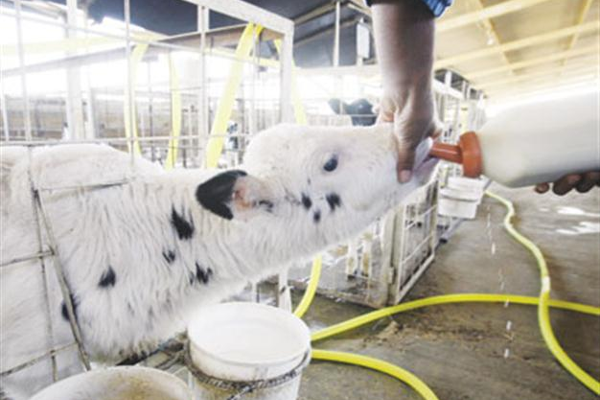Water dispute threatens last Iraq commercial farm
AS-SUWAYRA, Iraq - Agence France-Presse


A farmer feeds a calf on Nov 8 at a private farm in the Iraqi town of Suweira, 50 km south of Baghdad, where irrigation problems are threatening the livelihood of cattle. AFP photo
The grass is yellowing, the cows are emaciated and milk production is a fraction of what it once was -- Iraq’s last major commercial farm is dying a slow death due to a dispute over water.
The 1,600-hectare Al-Nasr farm, located in As-Suwayra about 60 kilometers southeast of Baghdad and owned by the wealthy Buniya family, had 3,500 Holstein cows, which once produced 12,000 tons of milk per day, according to farm manager Taher Yassin Mussawi.
But a dispute with As-Sanabel, the company supplying water to the farm, that saw its water supply cut off about a month ago because Al-Nasr was not paying for it, has hit the alfalfa and clover on which the cows would normally graze.
“The production of milk has fallen from 12,000 to 2,000 tons per day,” said Mussawi, as local authorities cut off water to the farm.
“We only have two weeks of fodder for the cows left, and if the problem isn’t resolved, they will all die,” he said, adding that some 10 cows are dying per day.
Mussawi also said that the weight of calves born recently had dropped to about 25 kilograms from a usual 42 kilograms.
The problem arose from a dispute over the price of water with As-Sanabel, which is owned by Iraqi MP Ibrahim al-Mutlaq, the brother of deputy prime minister Saleh al-Mutlaq.
Security forces were sent to the farm, blocking off the 10 sluice gates and a pipeline that provided it with water from a nearby canal.
“We decided to cut off the water because they have not paid since the beginning of the year,” said Faez Jawad, the head of the provincial council’s agriculture commission.
But Mussawi said it was not the council’s place to act alone.
“Our differences with As-Sanabel must be solved in court,” Mussawi said, expressing astonishment that “the officials of the province decided on their own to send the police and shut off the water.”
The agriculture committee has not backed down despite a November 3 letter from the ministry of agriculture, a copy of which was obtained by AFP, calling for water to the farm to be restored, as the law states that “we should not in any way harm the agricultural production that the country needs so much.”
While it was presented in antiquity as an immense orchard, and is said by some to be a possible location for the Biblical Garden of Eden, modern Mesopotamia’s agricultural production meets just 30 percent of its needs.
Iraq has for nearly 15 years experienced water shortages due in large part to the network of dams built by Turkey as part of a massive development project in its southeast.
The land that now makes up Al-Nasr, which was sold by the government in 1990, represents the biggest agricultural investment in the country, and the last of the 36 large farms that existed prior to the US-led invasion of 2003. All the others were looted.
